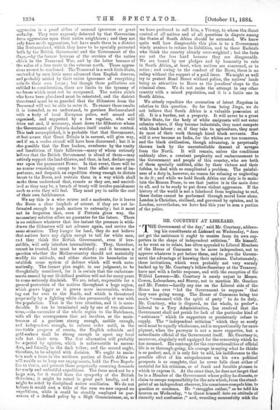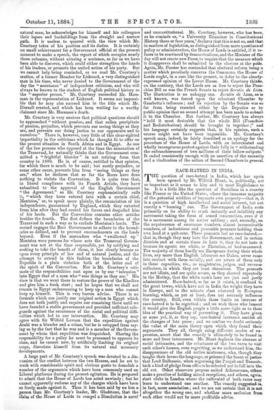MR. COURTNEY AT LISKEARD.
" THE Government of the day," said Mr. Courtney, address- ing his constituents at Liskeard on Wednesday, "does not get the assistance it ought to receive from its own sup- porters in the shape of independent criticism." He himself, as he went on to relate, has often appealed to Liberal Members of the House of Commons to be more independent, not to approve whatever is put before them, and to• give the Govern- ment the advantage of knowing their opinions. Unfortunately, these invitations, which were probably not very warmly backed up by Mr. Courtney's fellow-Secretary at the Treasury, have met with a feeble response, and with the exception of Sir Wilfrid Lawson—Mr. Courtney is surely unjust to Messrs. Cowen, Labouchere, and Storey, not to mention Mr. Goschen and Mr. Forster—hardly any one on the Liberal side of the House has ever "led the Government to suppose" that they were going wrong. The House of Commons being too much "consumed with the spirit of party" to do its duty, Mr. Courtney, who is disposed, on the whole, to prefer* a Liberal to a Tory Administration, has resolved that the Government shall not perish for lack of the particular kind of " assistance " which its supporters so persistently refuse to supply. The "independent criticism" which they so sorely need must be equally wholesome, and is unquestionably far more piquant, when the purveyor is not a mere supporter, but a subordinate official of the Government itself. Mr. Courtney is, moreover, singularly well equipped for the censorship which he has assumed. His contempt for the conventionalities of official life is so thorough-going, his courage in saying what he thinks is so perfect, and, it is only fair to add, his indifference to the possible effect of his outspokenness on his own political prospects is so complete, that he never falls short either of material for his criticism, or of frank and forcible phrases in which to express it. At the same time, he does not forget that he is a Member of the Government whose policy he dissects, or claim to escape responsibility for the acts which, from the stand- point of an independent observer, his conscience compels him to question or condemn. He "struggles rather," as be told his hearers on Wednesday, "to throw himself into an attitude of sincerity and confession ;" and, wrestling successfully with the
natural man, he acknowledges for himself and his colleagues their lapses and backslidings from the straight and narrow path. It is useless to quarrel with the view which Mr. Courtney takes of his position and its duties. It is certainly no small achievement for a Government official at the present moment to make a speech, the report of which occupies nearly three columns, without uttering a sentence, so far as we have been able to discover, which could either strengthen the hands of his leaders, or promote the united action of his party. But we cannot help being reminded, as we read Mr. Courtney's oration, of a former Member for Liskeard, a very distinguished man in his time, who never denied to the Government of the day the " assistance " of independent criticism, and who will always be known to the student of English political history as • the "Superior person." Mr. Courtney succeeded Mr. Hors- man in the representation of Liskeard. It seems not impossi- ble that he may also succeed him in the title which Mr. Disraeli created, and which has been waiting for a worthy claimant since Mr. Horsman's death.
Mr. Courtney is very anxious that political questions should be approached "without passion, and that sullen precipitate of passion, prejudice, which prevents our seeing things as they are, and prevents our doing justice to our opponents and to ourselves.' There is, however, very little of this clear-sighted impartiality in the criticisms which he thought fit to offer on the present situation in South Africa and in Egypt. As one of the few persons who opposed at the time the annexation of the Transvaal, he naturally thinks that the Government com- mitted a "frightful blunder" in not retiring from that country in 1880. He is, of course, entitled to that opinion, for which there is much to be said ; but surely prejudice, or some other cause, prevents him from "seeing things as they are," when he declares that so far the Boers have done nothing to violate the Convention. It is quite true that, in literal compliance with its Fourth Article, they have submitted to the approval of the English Government "the Agreement," as Mr. Courtney euphemistically calls it, "which they have entered into with a certain chief, Montsioa," or, to speak more plainly, the renunciation of his independence, guaranteed by England, which they extorted from him after they had routed his forces and despoiled him of his lands. But the Convention contains other articles besides the fourth. The first defines the boundaries of the Transvaal in such a way as to exclude Montsioa's lands. The second engages the Boer Government to adhere to the bound- aries so defined, and to prevent encroachments on the lands beyond. Even if the marauders who "swallowed up" Montsioa were persons for whose acts the Transvaal Govern- ment was not at the time responsible, yet by ratifying and seeking to take the benefit of them, it has clearly become so upon every principle of law and of natural justice, and the attempt to extend in this fashion the boundaries of the Republic is a plain violation both of the letter and of the spirit of the Convention. Nor is Mr. Courtney's esti- mate cf the responsibilities cast upon us by our " intrusion " into Egypt that of a man who "sees things as they are." His view is that we went there to restore the power of the Khedive and give him a fresh start ; and he hopes that we shall not remain in Egypt endeavouring to keep up a man who cannot keep up himself. This is very barren advice. There is no formula which can justify our original action in Egypt which does not both justify and require our remaining there until we have founded a stable government and provided sufficient safe- guards against the recurrence of the social and political diffi- culties which led to our intervention. Mr. Courtney may agree with Sir Wilfrid Lawson that the expedition against Arabi was a blunder and a crime, but he is estopped from say- ing so by the fact that he was and is a member of the Govern- ment by whom that expedition was despatched. Sharing the responsibility for a policy he must be presumed to approve its aims, and he cannot now, by artificially limiting its original scope, dissociate himself from its natural and necessary developments.
A large part of Mr. Courtney's speech was devoted to a dila-. cusaion of the conflict between the two Houses, and he set to work with considerable spirit and obvious gusto to demolish a number of the arguments which have been commonly used on Liberal platforms during the present agitation. He is. prepared to admit that the House of Lords has acted unwisely ; but he cannot apparently endorse any of the charges which have been so freely- made against it. Thus it has been said by no less a• person than Mr. Courtney's leader, Mr. Gladstone, that the 'claim of the Nouse of Lords to compel a Dissolution is novel and unconstitutional. Mr. Courtney, however, who has been, as he reminds us, "a University Examiner in Constitutional History three or four years," declares that this is not so, and that in matters of legislation, as distinguished from mere queetiontsef policy or administration, the House of Lords is entitled, if it re- fuses to be convinced by demonstrations, and the Minister of the day will not create new Peers, to require that the measure which it disapproves shall be submitted to the electors at the polls. Again, Mr. Forster has contended that electoral reform being a matter which peculiarly concerns the Commons, the House of Lords ought, in a case like the present, to defer to the clearly- expressed opinion of the Lower House. Mr. Courtney thinks, on the contrary, that the Lords are as free to reject the Fran- chise Bill as was the French Senate to reject Scrutin de Lists. The illustration is an unhappy one. Scrutin de Lists, as is well known, was forced upon the reluctant Chamber by Gambetta's influence ; and its rejection by the Senate was so far from being resented either by the Deputies or by public opinion that no second attempt has been made to submit it to the Chamber. But further, Mr. Courtney has always "held it most desirable that the whale Bill (Franchise and Redistribution) should be brought in together ;" and his language certainly suggests that, in his opinion, such a course might not have been impossible. Mr. Courtney's speech may, indeed, be fairly described as an apology for the procedure of the House of Lords, with an intercalated and wholly incongruous protest against their folly in "withstanding the enfranchisement of two millions of their fellow-subjects." It ended consistently enough with an assertion of the necessity and a vindication of the action of Second Chambers in general.



































 Previous page
Previous page